

E-Books → Family–Of–Origin Therapy An Intergenerational Approach
Published by: voska89 on 20-03-2024, 21:56 |  0
0
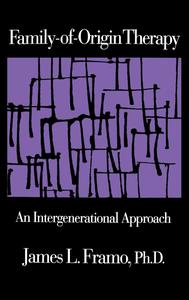
Free Download James L. Framo, "Family-Of-Origin Therapy: An Intergenerational Approach"
English | 1992 | pages: 421 | ISBN: 0876305907 | PDF | 1,9 mb
Considers the family-of-origin approach to the psychiatric counselling of adults in marital, family and individual therapy. The text discusses theoretical and clinical implications and provides three case studies to illustrate the application of this method.
E-Books → Nurse Manager's Guide to an Intergenerational Workforce
Published by: voska89 on 4-02-2024, 03:45 |  0
0

Free Download Bonnie Clipper, "Nurse Manager's Guide to an Intergenerational Workforce"
English | ISBN: 1937554759 | 2012 | 152 pages | PDF | 6 MB
[center]
E-Books → Kid Power, Inequalities and Intergenerational Relations
Published by: voska89 on 9-04-2023, 17:23 |  0
0
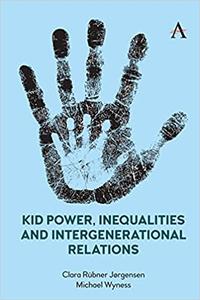
Free Download Clara Rübner Jørgensen, "Kid Power, Inequalities and Intergenerational Relations"
English | ISBN: 1785277707 | 2021 | 218 pages | EPUB | 432 KB
Contemporary understandings of inter-generational relations assume that the balance of power has shifted from adults towards children in recent years. The rise of children's rights, the trend towards more child-centred pedagogies and practices within schools and the incorporation of children within a global free market as consumers have all been interpreted as the loss of adult power and the consequent growth of kid power.
E-Books → Trajectories of Memory Intergenerational Representations of the Holocaust in History and the Arts
Published by: voska89 on 24-11-2022, 10:12 |  0
0
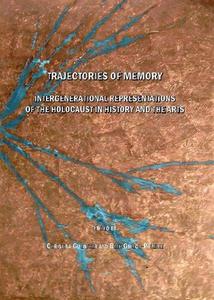
Trajectories of Memory: Intergenerational Representations of the Holocaust in History and the Arts By Christina Guenther (editor), Beth Griech-Polelle (editor)
2008 | 395 Pages | ISBN: 1847186467 | PDF | 4 MB
This volume, which grew out of a conference of the same name held at Bowling Green State University in March 2006, represents new scholarly perspectives on the way in which the Holocaust is remembered in history, literary studies and theatre. It is a response to changing representations of the Holocaust across generations, disciplines, and in various cultural and national contexts. The contributions address the following questions: How do historians, artists, scholars, and teachers negotiate the language of the Holocaust as survivors die, leaving future generations to respond to the dictum: Never again? How do children and grandchildren of survivors, perpetrators, bystanders transmit the difficult legacy of the Holocaust in American, Israeli, French, German, Swiss and Austrian contexts while navigating feelings of transgenerational guilt or victimhood? How can we do justice to survivor testimony when the survivors can no longer speak directly or mediate the testimony to us? How does transferred and multiply mediated knowledge translate into meaningful artifacts for the next generations? The collection features an interview about interdisciplinarity within Holocaust studies conducted at the conference with keynote speakers Marianne Hirsch and Leo Spitzer. The articles in the first section explore the complex relationship between memory, oral history and historiography in cross-cultural contexts. The second section includes articles on texts by Cynthia Ozick, Thane Rosenbaum, Daniel Handler, W.G Sebald, Monika Maron, Stephan Wackwitz, Jonathan Foer, Art Spiegelman, Georges-Arthur Goldstein, Binjamin Wilkomirski, Elfriede Jelinek, Thomas Bernhard, Tim Blake Nelson, and Diane Samuel.
E-Books → Future Freedoms Intergenerational Justice, Democratic Theory, and Ancient Greek Tragedy and Comedy
Published by: voska89 on 2-08-2022, 17:56 |  0
0

Elizabeth K. Markovits, "Future Freedoms: Intergenerational Justice, Democratic Theory, and Ancient Greek Tragedy and Comedy"
English | ISBN: 1138064580 | 2017 | 184 pages | EPUB | 637 KB
What do present generations owe the future? In Future Freedoms, Elizabeth Markovits asks readers to consider the fact that while democracy holds out the promise of freedom and autonomy, citizens are always bound by the decisions made by previous generations. Motivated by the contemporary political and theoretical landscape, Markovits examines the relationship between democratic citizenship and time by engaging ancient Greek tragedy and comedy. She reveals the ways in which democratic thought in the West has often hinged on ignoring intergenerational relationships and the obligations they create in favor of an emphasis on freedom as sovereignty. She claims that democratic citizens must develop a set of self-directed practices that better acknowledge citizens' connections across time, cultivating a particular orientation toward themselves as part of much larger transgenerational assemblages. As celebrations and critiques of Athenian political identity, the ancient plays at the core of
E-Books → Weight of Modernity An Intergenerational Study of the Rise of Obesity
Published by: voska89 on 28-06-2022, 01:23 |  0
0
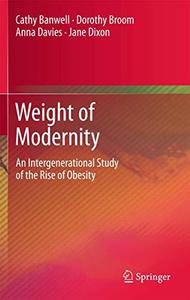
Weight of Modernity: An Intergenerational Study of the Rise of Obesity By Cathy Banwell, Dorothy Broom, Anna Davies, Jane Dixon
2012 | 200 Pages | ISBN: 904818956X | PDF | 3 MB
Over a half of adults in the US, Canada, Australia and numerous European countries are now overweight or obese, a proportion that has risen sharply in the past two decades. Dominant biomedical explanations focus on the energy equation - an imbalance between energy intake and expenditure - and remedies focus on motivating individuals to restore the balance by eating better and being more active, or - in extreme cases - surgical intervention.This book offers a perspective that sees increasing obesity as a social phenomenon as well as a public health problem. It contains detailed accounts of three generations of Australians' experiences of changing environments and the emergence of social trends such as increasing availability of convenience foods, the individualisation and commercialisation of leisure, car reliance, and busyness. Participants' narratives are interwoven with sociological and historical analyses of changes to show how contemporary Australians are experiencing and adapting to dramatic socio-cultural and environmental changes that are reshaping their lives and, in many cases, their bodies. The book demonstrates that obesity is an unintended consequence of economic development accompanied by profound socio-cultural changes, and by identifying the key developments the authors propose leverage points. While the research was conducted in Australia, the fundamental drivers of rapid weight gain are equally present in other modern, secular societies.
E-Books → Subjects of Intergenerational Justice Indigenous Philosophy, the Environment and Relationships
Published by: voska89 on 19-03-2022, 05:31 |  0
0
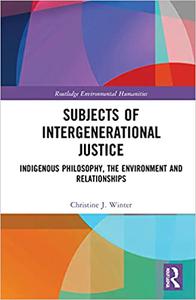
Christine J. Winter, "Subjects of Intergenerational Justice: Indigenous Philosophy, the Environment and Relationships "
English | ISBN: 0367551470 | 2021 | 202 pages | PDF | 3 MB
This book challenges mainstream Western IEJ (intergenerational environmental justice) in a manner that privileges indigenous philosophies and highlights the value these philosophies have for solving global environmental problems.
E-Books → Intergenerational Space
Published by: voska89 on 13-01-2022, 12:27 |  0
0
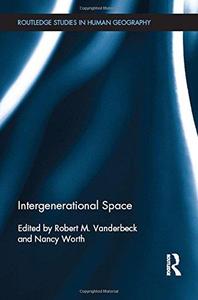
Intergenerational Space By Robert Vanderbeck, Nancy Worth
2014 | 366 Pages | ISBN: 0415855314 | EPUB | 8 MB
Intergenerational Space offers insight into the transforming relationships between younger and older members of contemporary societies. The chapter selection brings together scholars from around the world in order to address pressing questions both about the nature of contemporary generational divisions as well as the complex ways in which members of different generations are (and can be) involved in each other's lives. These questions include: how do particular kinds of spaces and spatial arrangements (e.g. cities, neighbourhoods, institutions, leisure sites) facilitate and limit intergenerational contact and encounters? What processes and spaces influence the intergenerational negotiation and contestation of values, beliefs, and social memory, producing patterns of both continuity and change? And if generational separation and segregation are in fact significant social problems across a range of contexts―as a significant body of research and commentary attests―how can this be ameliorated? The chapters in this collection make original contributions to these debates drawing on original research from Belgium, China, Finland, Poland, Senegal, Singapore, Tanzania, Uganda, the United States and the United Kingdom. .

